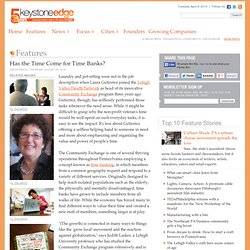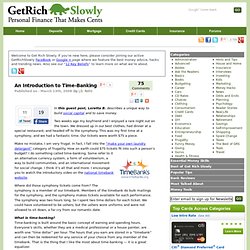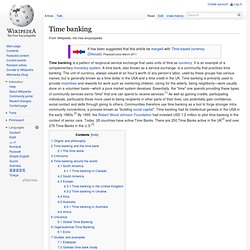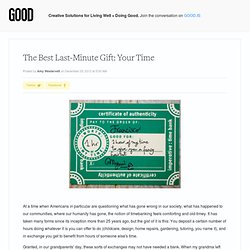

Has the Time Come for Time Banks? Joe Petrucci | Thursday, August 05, 2010 Laundry and pet-sitting were not in the job description when Laura Gutierrez joined the Lehigh Valley Health Network as head of its innovative Community Exchange program three years ago.

Gutierrez, though, has selflessly performed those tasks whenever the need arose. While it might be difficult to grasp why the non-profit veteran's time would be well-spent on such everyday tasks, it is easy to see the impact. It's less about Gutierrez offering a selfless helping hand to someone in need and more about emphasizing and organizing the value and power of people's time. The Community Exchange is one of several thriving operations throughout Pennsylvania employing a concept known as time banking, in which members from a common geography request and respond to a variety of different services. Community Exchange is considered one of the models of success. The idea of time banking sprouted in the U.S. about 30 years ago when Dr.
Photos: An Introduction to Time-Banking. In this guest post, Loretta B. describes a unique way to build social capital and to save money.

Two weeks ago my boyfriend and I enjoyed a rare night out on the town. We dressed up in our best clothes, had dinner at a special restaurant, and headed off to the symphony. This was my first time at a symphony, and we had a fantastic time. Our tickets were worth $75 a piece. Make no mistake, I am very frugal. Weaving a way to work together. For Spain's Jobless, Time Is Money. Building Community in Our Corner of Los Angeles. Time banking. Time banking is a pattern of reciprocal service exchange that uses units of time as currency.

It is an example of a complementary monetary system. A time bank, also known as a service exchange, is a community that practices time banking. The unit of currency, always valued at an hour's worth of any person's labor, used by these groups has various names, but is generally known as a time dollar in the USA and a time credit in the UK. Time banking is primarily used to provide incentives and rewards for work such as mentoring children, caring for the elderly, being neighborly—work usually done on a volunteer basis—which a pure market system devalues. Origins and philosophy[edit] According to Edgar S. As a philosophy, time banking also known as Time Trade[11] is founded upon five principles, known as Time Banking's Core Values:[12] Everyone is an assetSome work is beyond a monetary priceReciprocity in helpingSocial networks are necessaryA respect for all human beings The time dollar[edit] Dr.
The Best Last-Minute Gift: Your Time. At a time when Americans in particular are questioning what has gone wrong in our society, what has happened to our communities, where our humanity has gone, the notion of timebanking feels comforting and old-timey.

It has taken many forms since its inception more than 25 years ago, but the gist of it is this: You deposit a certain number of hours doing whatever it is you can offer to do (childcare, design, home repairs, gardening, tutoring, you name it), and in exchange you get to benefit from hours of someone else's time. Granted, in our grandparents' day, these sorts of exchanges may not have needed a bank. When my grandma left meals out on her front steps for hobos during the Depression she wasn't expecting them to pay her back by doing chores, nor was there a third-party broker negotiating pies for lawn mowing. Nonetheless, it feels like a tentative step away from some of the uglier trappings of modernity and toward using modern innovation to create a more traditional community.
How Boomers Can Take Advantage of Time Banking. The saying “time is money” just got a whole new meaning.

Time banking allows patrons to trade their skills for services they need, and the relatively-new concept is becoming increasingly popular among retirees. Here’s how it works: For each hour of service banked, members earn an hour’s worth of alternative currency known as “time dollars”, which can be traded for services from other patrons. A Community Time Bank. Timebank Re-design.